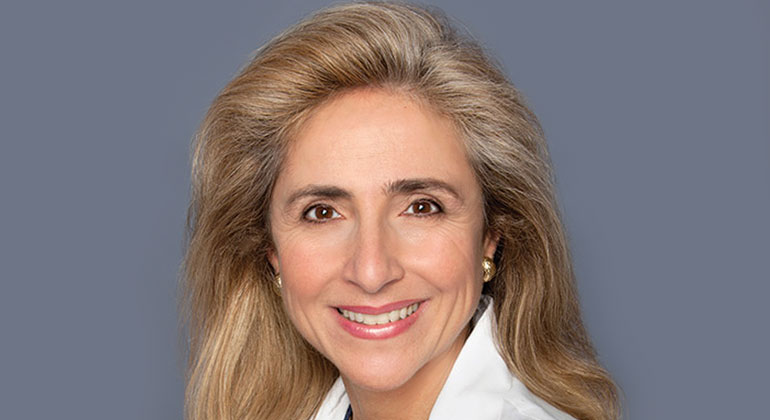Machine Learning Techniques Generate Clinical Labels of Medical Scans
The study’s findings will help train artificial intelligence to diagnose diseases

CLICK HERE to watch the researchers discuss this study.
Researchers used machine learning techniques, including natural language processing algorithms, to identify clinical concepts in radiologist reports for CT scans, according to a study conducted at the Icahn School of Medicine at Mount Sinai and published today in the journal Radiology. The technology is an important first step in the development of artificial intelligence that could interpret scans and diagnose conditions.
From an ATM reading handwriting on a check to Facebook suggesting a photo tag for a friend, computer vision powered by artificial intelligence is increasingly common in daily life. Artificial intelligence could one day help radiologists interpret X-rays, computed tomography (CT) scans, and magnetic resonance imaging (MRI) studies. But for the technology to be effective in the medical arena, computer software must be “taught” the difference between a normal study and abnormal findings.
This study aimed to train this technology how to understand text reports written by radiologists. Researchers created a series of algorithms to teach the computer clusters of phrases. Examples of terminology included words like phospholipid, heartburn, and colonoscopy.
Researchers trained the computer software using 96,303 radiologist reports associated with head CT scans performed at The Mount Sinai Hospital and Mount Sinai Queens between 2010 and 2016. To characterize the “lexical complexity” of radiologist reports, researchers calculated metrics that reflected the variety of language used in these reports and compared these to other large collections of text: thousands of books, Reuters news stories, inpatient physician notes, and Amazon product reviews.
“The language used in radiology has a natural structure, which makes it amenable to machine learning,” says senior author Eric Oermann, MD, Instructor in the Department of Neurosurgery at the Icahn School of Medicine at Mount Sinai. “Machine learning models built upon massive radiological text datasets can facilitate the training of future artificial intelligence-based systems for analyzing radiological images.”
Deep learning describes a subcategory of machine learning that uses multiple layers of neural networks (computer systems that learn progressively) to perform inference, requiring large amounts of training data to achieve high accuracy. Techniques used in this study led to an accuracy of 91 percent, demonstrating that it is possible to automatically identify concepts in text from the complex domain of radiology.
"The ultimate goal is to create algorithms that help doctors accurately diagnose patients,” says first author John Zech, a medical student at the Icahn School of Medicine at Mount Sinai. “Deep learning has many potential applications in radiology — triaging to identify studies that require immediate evaluation, flagging abnormal parts of cross-sectional imaging for further review, characterizing masses concerning for malignancy — and those applications will require many labeled training examples."
“Research like this turns big data into useful data and is the critical first step in harnessing the power of artificial intelligence to help patients,” says study co-author Joshua Bederson, MD, Professor and System Chair for the Department of Neurosurgery at Mount Sinai Health System and Clinical Director of the Neurosurgery Simulation Core.
Researchers at Boston University and Verily Life Sciences collaborated on the study.
About the Mount Sinai Health System
Mount Sinai Health System is one of the largest academic medical systems in the New York metro area, with 48,000 employees working across seven hospitals, more than 400 outpatient practices, more than 600 research and clinical labs, a school of nursing, and a leading school of medicine and graduate education. Mount Sinai advances health for all people, everywhere, by taking on the most complex health care challenges of our time—discovering and applying new scientific learning and knowledge; developing safer, more effective treatments; educating the next generation of medical leaders and innovators; and supporting local communities by delivering high-quality care to all who need it.
Through the integration of its hospitals, labs, and schools, Mount Sinai offers comprehensive health care solutions from birth through geriatrics, leveraging innovative approaches such as artificial intelligence and informatics while keeping patients’ medical and emotional needs at the center of all treatment. The Health System includes approximately 9,000 primary and specialty care physicians and 11 free-standing joint-venture centers throughout the five boroughs of New York City, Westchester, Long Island, and Florida. Hospitals within the System are consistently ranked by Newsweek’s® “The World’s Best Smart Hospitals, Best in State Hospitals, World Best Hospitals and Best Specialty Hospitals” and by U.S. News & World Report's® “Best Hospitals” and “Best Children’s Hospitals.” The Mount Sinai Hospital is on the U.S. News & World Report® “Best Hospitals” Honor Roll for 2024-2025.
For more information, visit https://www.mountsinai.org or find Mount Sinai on Facebook, Instagram, LinkedIn, X, and YouTube.

Mount Sinai Is First in "New York" to Study a Brain-Computer Interface Designed to Record
Jan 01, 2024 View All Press ReleasesBrain Cancer Expert Joins Neurosurgery Faculty at Mount Sinai
Jan 13, 2020 View All Press ReleasesMount Sinai Receives More Than $10 Million in Grant Funding for Brain Tumor Research
Jan 02, 2020 View All Press ReleasesArtificial Intelligence Platform Screens for Acute Neurological Illnesses at Mount Sinai
Aug 13, 2018 View All Press Releases


